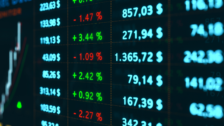The only prices that matter for investors
If you are an avid reader of the daily financial press, you could be forgiven for thinking that inflation is here to stay and that its time to stock-up on gold, inflation-linked bonds and cash to protect yourself. Such is the fervour of the inflation debate that headlines are now calling-out central banks to raise interest rates, despite continued communications that they will do nothing of the sort.
One of the most important and under-appreciated changes that occurred during the pandemic happened within central banks. After decades of failing to deliver on inflation targets, policy was switched to focusing on what was happening in the economy, rather than what was forecast to happen. That is, central banks would no longer seek to pre-empt inflation that hadn’t yet arrived. This is much more significant than many thought at the time, and is still not widely appreciated.
The key to success in investing is differentiating between the ‘white noise’ and what the economy and environment is actually telling us. This is central to the approach taken by the Franklin fixed income team in Australia, headed by portfolio manager Andrew Canobi.
In a recent thought-piece, Canobi highlighted the fact that “markets aren’t buying into the media-driven inflation hyperbole which continues to be dominated by click-bait around shortages” and supply chain issues. He highlights that many of the issues facing the economy are short-term, are not unexpected, and that more important long-term factors are at play.
In Canobi’s view, there are three “prices” that truly matter for the global economy. They are the price of oil, the value of the US dollar and the cost of borrowing, or the 10-year US Government bond yield.
Commenting on the incredible rally in the price of oil and booming energy markets, he highlights that despite the best efforts to decarbonise, “the fact remains that the world is still massively dependent on carbon-based energy.” This has important implications for the global economy, as higher oil and gas prices are a “meaningful cost impost” on consumers and businesses just as the economy appears to be slowing. In short, he says, these represent a “tax on growth,” at least until these costs can be passed on in the form of higher wages.
Moving to the US dollar, despite talk of the Chinese economy overtaking the US, the world remains short the currency it still requires for the majority of business. According to Canobi, the sheer amount of global debt denominated in USD is so “gargantuan” that any increase in the USD will actually tighten financial conditions. Nowhere is this more relevant than in emerging markets, where those running deficits are “vulnerable” to a surge in the USD. But they are not alone as “in general the world doesn’t work well with the big dollar surging,” he says.
The final price, being the 10 year bond yield, is under-appreciated but is the basis on which nearly every present value discounting model is based, whether in private or public markets. “No other rate is more significant in setting the benchmark for term funding for the world”.
He notes that while yields adjusted higher after the recent tapering announcement, they remain “somewhat contained” and still below the highs seen earlier in 2021. Importantly, in a longer-term context, “they remain low.”
And perhaps they should be, with the economy “limping out of the pandemic with record levels of debt.” Harking to the growing Modern Monetary Theory (MMT) crowd, he highlights that perhaps debt doesn’t matter if you are looking at the exuberance in equity markets. This is coming despite advanced economy debt-to-GDP ratio moving from 242 to 309 per cent since 2007, and China’s ratio more than doubling, to 322 per cent.
Concluding, Canobi says “a stronger USD driving borrowing costs higher at a time when the world is once again short oil and energy products would be disastrous.” Which is perhaps why long-term bond yield increases remain muted.











